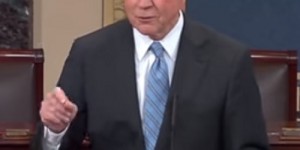Politico — Nine months ago, the new Homeland Security secretary, Jeh Johnson, received a request from the White House. President Obama wanted him to personally take on perhaps the administration’s toughest political assignment: looking for creative ways to fix America’s immigration system without congressional action—or executive overreach.
Just four months into the job, Johnson had been prepared to take on tough security issues: Bombs on planes. Deadly diseases. Radical Islamists carrying U.S. passports. As the Pentagon’s chief counsel, Johnson had routinely dealt with contentious national security matters, finding himself in the midst of sensitive political fights like whether and how to close Guantanamo Bay, allowing gays in the military, and the rapid expansion of America’s killer drone program.
He wasn’t prepared for a crisis of purely political making.
Just days earlier Obama had been labeled the “deporter in chief” by a top Hispanic leader and ally, furious over the inaction by a president who seemed trapped between the demands of his supporters to allow millions of long-time residents who lacked documentation to stay in the country, and the seemingly endless foot-dragging of Republicans.
That request to Johnson would prove critical: a moment when the president set on the path of a much more ambitious change than the narrow changes in civil enforcement policy he and his aides had initially explored. In the remaining months of 2014, Obama would come to support a sweeping executive action to allow millions of undocumented immigrants to stay in the country, as Congress lurched from willingness to consider changes to strained immigration laws to refusing to tackle the issue at all. Meanwhile, interest groups from the Congressional Hispanic Caucus to the Business Roundtable, from K Street’s shrewdest lobbyists to the most hard-nosed union bosses, intervened to try to shape the direction of the order.
At several key points, Obama wavered under pressure from members of his own party, worried about an electoral collapse that happened anyway when the votes were counted in the midterm elections earlier this month. Throughout, Johnson worked, largely in secret on the grand plan that finally became public this week, convening a small group of former Capitol Hill aides with expertise on immigration to work with Homeland Security officials to draft a policy that all expected would provoke not only fierce opposition from conservatives but from liberals who thought Obama should go further. It was a consuming task: in all, sources said, the immigration issue ate up fully half of the Homeland Security secretary’s time in recent months, with Johnson —a high-powered corporate attorney in his previous life — writing the final presidential memorandum himself.
By the time Obama went before the American people to unveil his plan in an Oval Office speech to the nation Thursday night, the White House and DHS had exchanged dozens of drafts and endured months of starts and stops, punctuated by a sharp electoral defeat for their fellow Democrats. Still, they went forward, with the president finally telling aides of his decision in the Roosevelt Room of the White House on Monday night.
Johnson, for his part, seemed anxious to be done with a journey he portrayed as a political lesson.
“I was new to immigration law and policy…when I came into this job,” Johnson said this week. “Before that it was law of armed conflict, national security fiscal law. I’ve been disheartened and disappointed with how volatile the issue has become in American politics. I hope that people will look at immigration reform from a common sense point of view, what makes common sense, what’s practical, what’s pragmatic.”
Summer of miscalculations
Three months after Obama’s first overture to Jeh Johnson, Republicans had not given up on the idea of an immigration plan of their own. At least, some argued, there was a political opening to forestall any independent action by the president. June 12 was the day that Rep. Mario Diaz-Balart (R-Fla.) planned to unveil to House leaders an immigration bill that, he was convinced, many Republicans could get behind…





























Speak Your Mind
You must be logged in to post a comment.